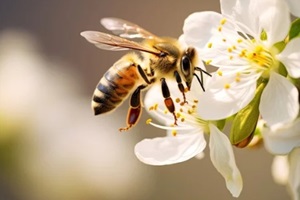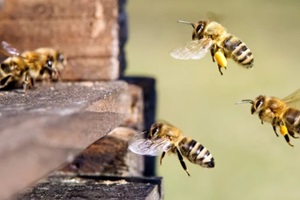 The arrival of spring often puts people in a good mood, as fresh blooms brighten the landscape and the weather becomes warm and pleasant. Alongside the many flowers and trees whose buds mark the start of the season, new spring insects will arrive as well.
The arrival of spring often puts people in a good mood, as fresh blooms brighten the landscape and the weather becomes warm and pleasant. Alongside the many flowers and trees whose buds mark the start of the season, new spring insects will arrive as well.
It can be exciting to catch a glimpse of a honeybee buzzing around or a caterpillar preparing to transform into a butterfly — but what’s less exciting is noticing ants in the house or mosquitoes in the yard.
Massachusetts is home to a diverse range of animal and insect life, but not all of them are welcome in and around our homes. Here are some things to know before spring arrives to prepare you for potential insect invaders.
Early Arrivals: Common Spring Insects
After the cold of winter, many insects emerge from their hidden nests to find food, replenish their energy, and begin expanding their colonies in the coming warm months.
Among these, flying insects such as wasps and hornets are some of the most common. These buzzing bugs play an important role in pollination by traveling from plant to plant, dispersing the reproductive materials necessary to grow new flowers; still, they don’t need to nest at your home.
Similarly, spiders and ants will be out in full force, trying to stock up their food supplies. From annoying webs on your property to lines of ants along the baseboards, these pests thrive on the food your home provides.
Emerging Pests: Dealing with Seasonal Insect Challenges
No spring season would be complete without the return of some of the most pesky insects: mosquitoes and ticks. Homeowners frequently see an explosion of population in both of these bugs during the spring, as moisture from rain provides ideal conditions for their reproduction.
The simplest way to stop seasonal insect challenges in their tracks is to opt for integrated pest control solutions. Build from the ground up, identifying why the bugs are choosing your property and how you can make it less appealing.
For instance, mosquitoes need standing water in order to breed. You can begin the process of mosquito-proofing your property by removing breeding opportunities such as bird baths, plant pots, and old tires or barrels that might develop a shallow pool of water.
 Another option is to detach the grass. When grass grows thick and contains a lot of old plant material underneath the new blades, the area near the ground can become extremely moist.
Another option is to detach the grass. When grass grows thick and contains a lot of old plant material underneath the new blades, the area near the ground can become extremely moist.
Not only is it bad for the grass’s roots, but it also provides a haven for ticks to find shelter and may even house enough water for mosquito reproduction. Bring some fresh air into the yard and soil to reduce the appeal of your property to pests.
Addressing ticks and mosquitoes in particular is essential, as these bugs can carry numerous diseases and are a public health concern. From Zika virus in mosquitoes to Lyme disease carried by ticks, these pests can make people and pets very sick — and the best way to handle this risk is to avoid getting bitten in the first place.
Citizen Science and Insect Monitoring
In addition to taking charge of your own home’s pest control solutions, consider partnering with the community at large to make your neighborhood, city, and county a more pleasant place to be.
Citizen science programs grant the opportunity for normal folks to partner with scientists to monitor and research insect populations. This can be as simple as reporting which insects you’re seeing at your home, so it takes very little commitment to make a big difference.
Massachusetts residents who participate in monitoring efforts are contributing to scientific knowledge.
Professionals and academics will use this information to recommend more targeted and effective pest control solutions on a large scale, including introducing competing favorable bugs and targeting certain communities for control measures.
They may do more aggressive mowing of public spaces such as parks and medians if ticks have been on the rise in a certain area, for instance.
Prevent Spring Insects from Gaining a Foothold
 Insects are a normal part of the natural environment, and in many instances, they are useful for their contributions to the ecosystem.
Insects are a normal part of the natural environment, and in many instances, they are useful for their contributions to the ecosystem.
From spiders that catch and eat pest insects to pollinators who help flowers and trees grow and produce fruit, we should aim to eliminate every bug we see. Still, Massachusetts residents need pest control to stop spring insects from invading their homes.
Spartan Animal & Pest Control is a leader in spring insect control, targeting the bugs that are most likely to cause you the greatest trouble during this time of year. Our expert team can build a pest prevention strategy from the ground up that is customized to the unique challenges of your property. Contact Spartan today to get started.



